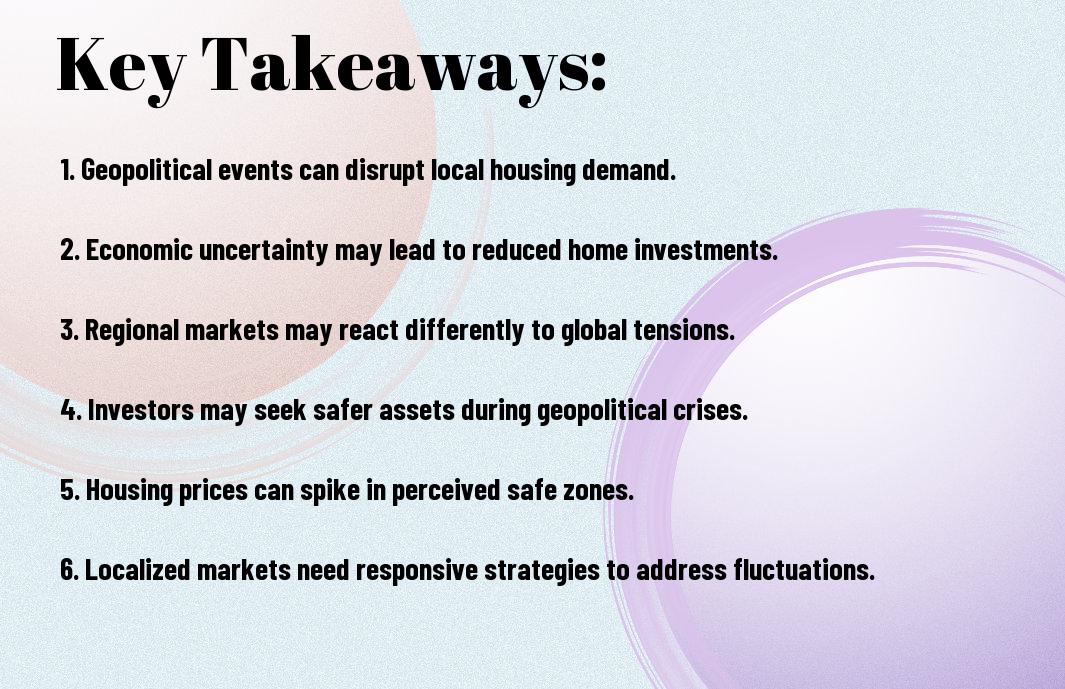Most people may not realize that global events can directly influence local housing markets. As geopolitical tensions rise, you might find yourself wondering how these international issues impact your real estate investments and home values. This blog post researchs into the intricate relationship between global political dynamics and localized housing market fluctuations, offering insights into how you can safeguard your property interests amid a rapidly changing landscape.
Key Takeaways:
- Geopolitical tensions can lead to localized housing market fluctuations due to shifts in demand and investor confidence in specific regions.
- Areas perceived as safer or more stable may experience increased demand, driving up prices, while regions directly affected by tensions may see a decline in property values.
- Factors such as job security, local economic conditions, and migration patterns play a significant role in determining the extent of these fluctuations in housing markets.
Understanding Geopolitical Tensions
Before delving into housing market fluctuations, it’s vital to grasp what geopolitical tensions are. These tensions often arise from conflicts between nations, such as trade disputes, military confrontations, or diplomatic rifts, creating a ripple effect you need to comprehend, especially as it pertains to markets and investments.
Definition and Examples
Before you can understand the implications of geopolitical tensions, you should recognize their definition. Geopolitical tensions generally refer to conflicts or rivalries between countries that can manifest in various forms, such as trade wars, military skirmishes, or diplomatic stand-offs. Examples include U.S.-China trade negotiations, the Ukraine-Russia conflict, and tensions in the Middle East, all of which can significantly influence economic stability.
Impact on Global Economies
For those monitoring economic trends, geopolitical tensions can lead to uncertainty, affecting global markets, including housing. When countries experience conflicts, foreign direct investments may dwindle, and consumer confidence can waver, impacting not only international markets but also your local economic conditions.
Examples of this impact are evident during significant geopolitical events, such as the U.S.-China trade war which led to increased tariffs and market volatility, affecting global supply chains. Similarly, instability in regions like the Middle East can lead to fluctuations in oil prices, impacting economies worldwide. These elements ultimately influence housing markets, as uncertainty can lead to decreased investment in real estate or shifts in demand based on local and global sentiments.
The Housing Market Landscape
One of the most dynamic aspects of modern economies is the housing market, which often reflects the broader economic landscape and can be significantly influenced by local and global events. As geopolitical tensions arise, they can impact investor confidence, consumer behavior, and ultimately the availability and pricing of housing in specific regions. Understanding this interplay is vital for navigating potential fluctuations in your local housing market.
Factors Influencing Housing Prices
Behind the fluctuations in housing prices are several key factors that shape the market dynamics. These include:
- Supply and demand of available homes
- Interest rates and mortgage availability
- Economic health and employment levels
- Local amenities and school quality
- Geopolitical events impacting investor sentiment
The interplay of these factors can lead to varying levels of price volatility in different areas.
Historical Trends of Housing Fluctuations
Landscape trends in housing have shown that many significant fluctuations correlate with broader socio-economic dynamics, including geopolitical conflicts. History reveals that times of uncertainty often lead to increased volatility in local housing markets, as buyers’ confidence wanes and sellers adapt their strategies. Events such as wars, trade disputes, or economic sanctions can alter the demand-supply balance, leading to fluctuations that you should be aware of when considering investing or selling a property.
Housing markets have shown a pattern of responding to various external influences throughout history. For instance, during times of geopolitical tension, housing prices can experience rapid increases or declines based on shifts in consumer and investor confidence. In periods of crisis, you may observe a flight from markets deemed unstable, resulting in localized drops in prices, while more stable locations can see a surge in demand as people seek refuge from uncertainty. This responsiveness highlights the importance of being informed about both local and broader international events that may impact your housing market decisions.
The Link Between Geopolitics and Housing Markets
All geopolitical events can significantly impact housing markets, affecting supply, demand, and pricing in localized areas. For instance, tensions over resources often lead to shifts in real estate investments and housing developments. As highlighted in the Geopolitics of the Energy Transition: Critical Materials, the interplay of politics and economic strategies can result in unexpected fluctuations in housing markets, demanding your attention as an investor or homeowner.
Case Studies of Localized Market Reactions
On various occasions, geopolitical tensions have led to unique market reactions in different regions. Here are some notable case studies:
- 2014 Ukraine Crisis: A 25% drop in real estate prices in Crimea after the annexation by Russia.
- 2019 US-China Trade War: A 15% increase in housing prices in rural areas of the US as local economies adapted.
- 2020 Middle East Tensions: A 10% rise in real estate demand in neighboring countries like Jordan and Lebanon.
- 2021 Afghanistan Withdrawal: A 20% increase in housing prices in areas experiencing an influx of refugees.
Mechanisms of Influence
At times, geopolitical actions can lead to shifts in consumer confidence, affecting your real estate values. Trade sanctions, military engagements, or resource shortages can alter the economic landscape, causing fluctuations in housing demand and pricing. These external factors create a ripple effect that can influence local markets. For instance, an influx of refugees due to a conflict can drive up housing prices in the receiving areas, illustrating how external events directly impact local housing dynamics.
Further, changes in interest rates, lending practices, and investment opportunities brought about by geopolitical tensions can directly affect your ability to buy or sell properties. Understanding these mechanisms can enhance your decision-making process in the housing market, allowing you to navigate potential fluctuations strategically.
Investor Sentiment and Housing Markets
Not only do geopolitical tensions create uncertainty in global markets, but they also significantly impact local housing dynamics. As you navigate these changes, you’ll notice that investor sentiment can shift rapidly in response to perceived risks. When tensions escalate, investors may either retreat from the housing market, anticipating declines, or seek refuge in markets deemed stable, ultimately influencing supply, demand, and pricing in your local area.
Behavioral Economics in Real Estate
Behind every housing decision lies the influence of behavioral economics, which examines how psychological factors shape your investment choices. As you confront market fluctuations tied to geopolitical events, your emotional responses can distort rational decision-making, leading to erratic buying or selling behaviors. Recognizing these biases can empower you to make more informed choices during volatile times.
Risk Perception and Decision Making
After evaluating the impact of geopolitical tensions, your risk perception will likely shape your strategies in the housing market. These external factors can trigger heightened anxiety, steering you toward caution in your investment decisions. Understanding how your perception of risk affects your behavior is crucial for navigating these fluctuations effectively.
Hence, acknowledging your heightened risk perception in light of geopolitical tensions can help you make balanced real estate decisions. You may find yourself drawn to safer investments or markets that appear more stable during times of uncertainty. It’s vital to assess whether these instincts are based on accurate information or simply emotional responses. By maintaining a clear perspective and relying on data-driven insights, you can protect your investments and potentially seize opportunities in the ever-shifting housing landscape.
Policy Responses to Housing Market Volatility
Now is the time to understand how governments can respond to the fluctuations in housing markets that may arise due to geopolitical tensions. Effective policy responses can stabilize your local market, ensuring that it remains resilient amid external pressures. By examining various strategies, you can be better prepared for changes that might impact property values and availability in your area.
Government Interventions
Along with economic adjustments, government interventions play a pivotal role in addressing housing market volatility. You may see initiatives such as rent controls, subsidies for homebuyers, or increased public housing projects intended to alleviate the negative effects of market fluctuations. These measures can directly influence your housing situation by increasing affordability and accessibility in your community.
Economic Policy Adjustments
Above all, economic policy adjustments can significantly impact housing markets, especially in response to geopolitical events. As you navigate these changes, various fiscal and monetary policies will shape your local real estate landscape. Understanding these adjustments can help you make informed decisions about buying or selling property during volatile times.
Eeconomic policy adjustments often include changes in interest rates, tax incentives, and government spending initiatives. These alterations aim to stimulate or cool down the economy, which can directly affect housing demand and supply. For example, if interest rates are lowered, you may find it easier to secure a mortgage, thus increasing demand for homes in your area. Conversely, tightening monetary policy could lead to higher borrowing costs, damping your housing market. Staying informed about these adjustments allows you to anticipate market changes and make more strategic housing decisions.
Future Projections for Housing Markets
To anticipate the future of housing markets amid geopolitical tensions, you should observe key indicators such as interest rates, consumer confidence, and regional stability. Areas that experience significant turbulence due to international conflicts may face fluctuations, while stable regions could see moderate growth. By staying informed on these factors, you can better navigate the housing landscape in the years to come.
Trends to Watch
Above all, you should be on the lookout for shifts in buyer preferences, especially in areas perceived as safe havens. As geopolitical concerns rise, urban centers may experience a decline in demand, while suburban and rural areas could become more appealing. Adaptability and awareness of these trends can help you make sound investment decisions.
Long-term Implications of Geopolitical Stability
Implications of geopolitical stability extend far beyond immediate market fluctuations. You will find that long-term peace can stabilize housing markets in affected areas, promoting investor confidence and encouraging development. In contrast, persistent tensions may lead to prolonged uncertainty, potentially deterring investment and stunting growth.
But understanding the nuances of geopolitical stability is vital for your investment strategy. You might observe that countries with stable relationships can foster economic growth and attract more homeowners, while those experiencing ongoing disputes may suffer from stagnant prices and reduced demand. As you consider your future in real estate, balance your portfolio by incorporating regions with strong geopolitical stability to mitigate risks associated with localized volatility.
Conclusion
Drawing together the insights on geopolitical tensions and localized housing market fluctuations, it’s clear that external factors can significantly influence your real estate decisions. You may find that rising tensions can alter buyer sentiment, shift investment patterns, and impact property values in your area. Staying informed on global affairs and understanding how these events may affect your local housing landscape can empower you to make more strategic choices as a property owner or investor.
FAQ
Q: How do geopolitical tensions affect housing demand in specific regions?
A: Geopolitical tensions can lead to shifts in housing demand as people may seek to relocate to areas perceived as safer or more stable. For instance, if a country is experiencing conflict, residents may choose to move to neighboring countries or less volatile regions, leading to an increase in demand and potentially driving up housing prices in those areas. Conversely, regions that are perceived as being at risk may experience a decrease in housing demand and subsequently lower prices, creating localized fluctuations in the market.
Q: Are there particular types of housing markets that are more sensitive to geopolitical events?
A: Yes, housing markets in metropolitan areas or regions with significant international investment often show heightened sensitivity to geopolitical events. Markets that are reliant on foreign buyers, such as luxury condos or vacation homes, can experience sudden declines in demand if tensions arise. Additionally, residential areas near military installations or borders may also see pronounced fluctuations, as every geopolitical development could trigger varying levels of security concerns and affect residency patterns.
Q: Can local governments mitigate the effects of geopolitical tensions on their housing markets?
A: Local governments can implement measures to stabilize housing markets during periods of geopolitical strain. Strategies may include incentivizing new developments, providing tax breaks for residents or investors, and enhancing security measures in the community. Governments might also focus on improving local amenities and promoting their regions as safe havens, which can bolster housing demand despite broader geopolitical uncertainties. These proactive steps can help counteract the negative impacts of geopolitical tensions on local housing markets.







